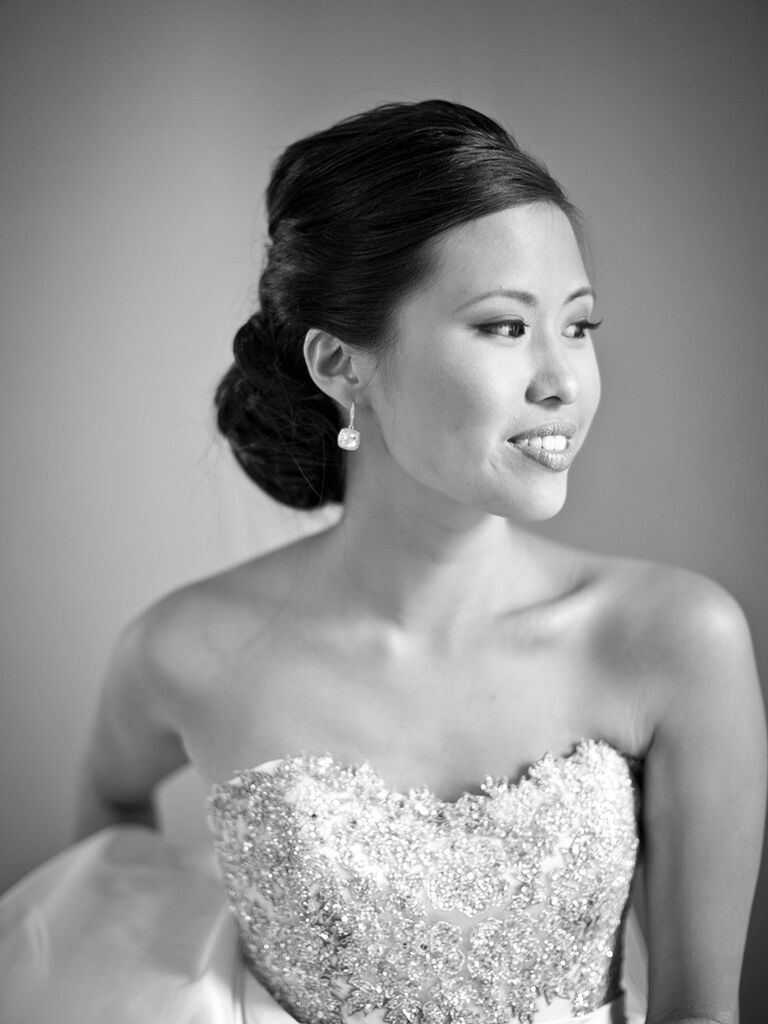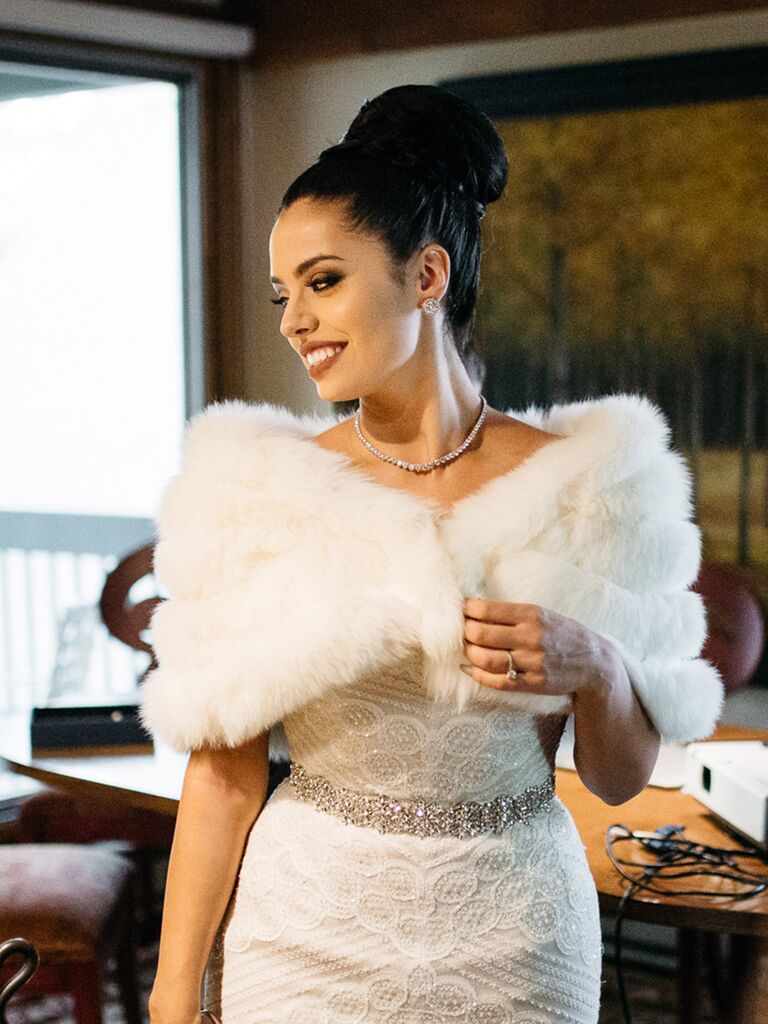Should You Wear a Necklace With a Wedding Dress
Now that you've found your gown, the next step is choosing the finishing touches. Find our advice on picking the perfect accessories here.
Sure, your wedding dress may be the star of the show, but the right accessories will totally elevate your look and add a personal touch (or three). But between jewelry, shoes, veils and other pieces, there can be a dizzying amount of choices to make, and you definitely don't want to go overboard. So before you buy anything, read our top style rules for accessorizing your wedding dress.
1. Match Your Metals

You may not realize this, but some metals look better with certain dress colors. As a general rule, ivory is best paired with gold since it highlights the creamy tint of the fabric. For a pure white dress, choose accents in silver or platinum or with pearl detailing—gold may clash with brighter white hues. You can have your pick with a diamond-white gown—this barely off-white color looks amazing with yellow gold, rose gold, silver or pearls. If the dress you chose is already embellished with beadwork, let that dictate the colors of your accessories. For example, if your gown has gold beading, pick a necklace, bracelet or earrings with a gold base.
2. Less Is More

You don't need a veil, tiara, earrings, necklace and a sash. Accessories add a unique touch to your look—which we love—but one too many can be downright distracting. Before you start buying, take an inventory of your gown's standout features and then base your choices around them. If your dress has an ornate neckline, opt for a pair of drop earrings instead of a necklace (that might look too busy). For a gown with a simpler style, try a bold statement necklace or fascinator. When it comes to earrings, take a cue from your hairstyle. If you're leaving your hair down and over your ears, small studs or drops will do. But for an updo, you might want something a little more dramatic, like a pair of chandelier danglers. It's always a good idea to avoid designs that closely mimic the embellishments on your gown—you don't want to look too matchy-matchy.
3. Know Your Veils

The veil is the iconic bridal accessory. From flirty birdcages to regal cathedral-length styles, there's no shortage of options. But there are a few things you should keep in mind as you narrow down the type of veil you plan to wear. First of all, you'll want your veil to match the exact shade of your gown (color blocking is better left to your day-to-day look). And be mindful when choosing a style—if your dress has a lot going on, stick with something simple that won't steal the spotlight. If showing off the back of your dress is a must—say, you have gorgeous embroidery or beading—choose a sheer veil rather than one with two layers of tulle. Lastly, Consider your body type: Longer waltz or floor-length veils will elongate a petite frame while mid-length styles, like fingertip or elbow-length veils, can visually cut you in half, making them a better pick for taller brides. Short styles, like a birdcage or bandeau, work for all shapes and sizes and lend a fun, retro vibe to your gown.
4. Top It Off

Are veils not really your thing? From hair combs to fascinators, there are plenty of other ways to top off your look. Choose your hairstyle before you pick your accessory, since some types will look better with updos than others. A flower crown, for example, is best with loose locks. You should also consider your hair type—dainty accessories may be perfect for fine hair, but won't be as noticeable in thick waves. Most importantly, make sure whatever you pick feels secure while you're moving around.
5. Think Beyond Jewelry

Looking for a super-simple way to add a bit of personality to your wedding dress (and help create the illusion of curves)? Add a belt or sash. Just because your dress doesn't come with one, doesn't mean it won't look great—a fashionable fastener is an easy way to customize your gown and change its look without having to make expensive alterations. And whether you go with a classic satin sash or metallic leather belt, it will give your dress an instant upgrade. The key to choosing the right waist-cincher is to find one that works with your body type. Thin belts are best suited to short torsos, while wider belts work well with longer ones. If you're an apple shape, think about a beaded or heavily embellished belt to flatter your midsection. If you're petite, a belt with V-shape appliqué will elongate your body. As a general rule, stick with a style that's no more than three-inches wide—you don't want to overpower the rest of your gown.
6. Keep It Comfy

No outfit is complete without the perfect pair of shoes—and your wedding day look is no exception. Of course you'll want a killer pair to go with that gorgeous dress, but that doesn't mean you have to compromise on comfort. Don't forget: You'll be standing for long periods of time, and you don't want to be cringing in pain before you've even hit the dance floor. While shopping, consider the height of the heel (obviously the taller you go, the higher the pain potential), the type of straps and the material. Your feet need to be well supported (think: ankle and toe straps over slip-ons) to avoid instability. Look for high-quality natural materials. They're infinitely more comfortable than synthetic ones and are also a lot more durable, meaning you'll be able to wear them again.
For the best fit, go shopping at the end of the day, when your feet are swollen from activity, and give yourself plenty of time to break in your new kicks before the wedding. Wear them around the house a couple weeks prior to the day, noting any areas that are prone to blisters. To make your shoes more comfortable, consider buying moleskin, heel grips, strap stickers or gel insoles designed specifically for heels. Shoes too strappy to conceal an insole or grip? Pick up a spray, wax or cream that protects against friction or provides anti-inflammatory pain relief to keep your feet happy.
7. Cover Up

A stylish cover-up is a must if you're getting married during the cooler months or at a house of worship that requires you to cover your shoulders. From boleros to capelets and fur stoles, the options are endless. (Bonus points: It makes for an easy transition look between your ceremony and reception.) The key is to choose one that strikes the perfect balance with your gown. Simple, understated styles can be paired with more embellished cover-ups, like a beaded capelet with scalloped edges or a bold sequined or feather bolero for added personality. For already ornate gowns, try a more minimal accent to avoid looking too over the top. A delicate lace jacket, sheer tulle cape or a chiffon wrap will keep you warm without competing with your gown. Another option? A classic cardigan, the perfect complement to a rustic or more laid-back affair.
8. Consider Your Décolletage

Pairing your neckline style with the proper adornment can add character to your wedding gown, or even highlight a unique feature.
If your dress is sweetheart or strapless, skip the necklace and focus on an elegant pair of chandelier earrings instead. Wear clear crystal for a sleek look, or add punch with a hint of color. Try using a meaningful gem, like your birthstone, or pick a hue from the flowers in your bridal bouquet. If you're going for a flirty, fresh look, include two or three small fresh or silk flowers in your hair to add a soft, organic feel. Vintage elegance more your style? Pay homage to the past with an art-deco-style bracelet or some roaring twenties–inspired feather barrettes.
Got a V-neckline going on? Whether you opt for a pendant or choker, this style begs for a little décolletage decoration. A thin chain with a simple pendant, like a locket, is an elegant way to accessorize, while pearls (single- or double-stranded) are always a classic choice. If you're going for a more decadent look, a crystal choker or statement necklace with matching earrings could be the perfect combo.
And if your gown is halter (or reverse halter), think about what's best for a shoulder-baring style: Skip the necklace and focus on dressing up your tresses. Headbands are a great way to add panache to your wedding updo, be it a sleek bun or loose ponytail. But if headbands aren't quite your style, try adding some sparkle to your hair with intricate crystal hairpins. If you've got a curly mane, five to seven hairpins is the perfect number, while brides with thinner locks (or shorter hair) need fewer—just two or three pins will do the trick.
9. Stick to What You Know

Although it's a special day, don't stray too far from your normal style. If you rarely wear jewels, there's no need to drown yourself in diamonds on your wedding day. The goal is to look and feel like the best, most beautiful version of your regular self.
Shop shoes, veils, jewelry and more here.
stinsonmilatichated.blogspot.com
Source: https://www.theknot.com/content/top-10-wedding-accessory-tips
0 Response to "Should You Wear a Necklace With a Wedding Dress"
Yorum Gönder